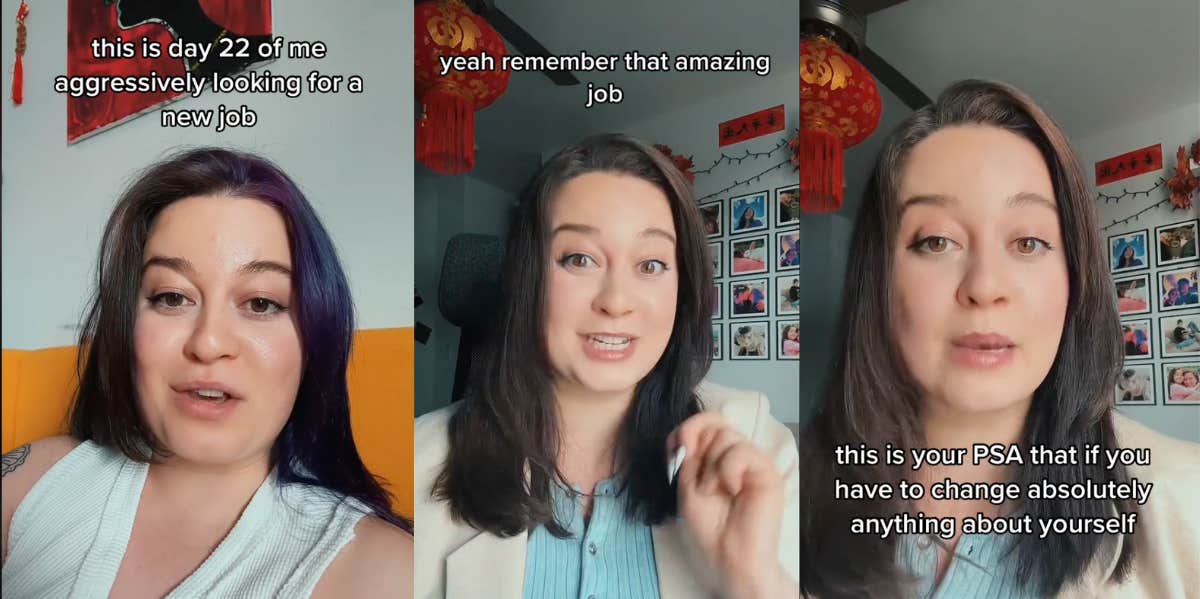Woman Told She Has To Change Her Appearance For Job Interview In Order To Be Hired
She detailed the red flags she noticed right off the bat during the interview process.
 @adminandeve / TikTok
@adminandeve / TikTok A woman whose TikTok presence centers around corporate work culture has been job hunting for months and taking her followers along on her journey. She’s experienced the highs and lows of trying to find work, including being offered “the interview of a lifetime,” only to discover the caveats involved.
The woman was told she’d have to change her appearance just to get an interview for a job at a finance firm.
Eve explained in a TikTok video that the job interview she’d found through her recruiter was undeniably alluring, with an annual salary range between $150,000 and $180,000.
“It’s five days in office, but for that money, I will bark,” she said. “The only problem is, they would want me to dye my hair for the job.” Eve’s natural hair color is dark brown; she has it dyed a deep yet subtle purple.
“I’m really struggling with changing myself for a job when I know that my work is really good,” she explained. Her internal conflict about dyeing her hair back to brown highlights a larger issue at play — the rigidity of American corporate culture, and the discrimination that it enables.
“I know what you guys are saying,” Eve spoke to her followers. “‘Just dye your d–-m hair,’ but it, like, means a lot to me.”
The TikTok community came through for her, with one follower suggesting she use temporary spray-on hair dye to cover up her purple hair throughout the work week.
Despite changing her hair color from purple to brown for the interview, Eve detailed the red flags that led to her take herself out of the running for the position.
She posted a stitch video with her original post, stating, “Remember that amazing job? I just rescinded my own candidacy.”
She reported that her interview experience at the finance firm was so off-putting, she decided she didn’t want the job at all. Not only that, the job she interviewed for wasn’t the position she was initially told she’d be hired for.
“First of all, they just laid it on me that there are two jobs at the firm, and that the job that I’m interviewing for is not the 150 to 180K base — it’s 110 to 120... I’m also interviewing with three other places who are offering that and are not requiring me to dye my hair,” Eve said.
She also reported a general feeling of disrespect during the interview process, calling out the interviewer as “outwardly, blatantly rude.”
“It was probably the worst interview I’ve ever had, not from my end, but because they were nasty,” Eve reported.
She stated that all the interviewer wanted to know was why her time in recent roles had been shorter than the rest of her career. “Um, hi Covid! Everybody’s getting laid off! World is on fire!” She exclaimed.
“Then they started judging me for having a business, and when I explained to them that the company I was with liked that, they gave me the side eye, a literal side eye,” she said. She stated that they also kept muting her microphone to talk to each other, which was the final straw in determining that the job wasn’t for her.
Eve posted another video, in which she stated, “This is your PSA that if you have to change absolutely anything about yourself to be able to interview at a company, let alone be allowed to work there, it’s already not a good fit and you’re not going to enjoy working there.”
“‘Oh, it’s just my hair, oh, it’s just my tattoos,’” she said. “No amount of money is gonna make a job a culture fit. Culture matters.”
Appearance-based discrimination in the workplace is nothing new. It’s something that disproportionately affects Black women in the corporate world, yet people are taking legislative action against racist policies.
The CROWN Act, or the Creating a Respectful and Open World for Natural Hair Act, passed the House of Representative in March 2022. The measure was introduced by Representative Bonnie Watson Coleman, a Democrat from New Jersey. The Act has yet to pass in the Senate and will be reintroduced in the 2023 legislative session.
According to the CROWN Act’s website, the Act exists to “ensure protection against discrimination based on race-based hairstyles by extending statutory protection to hair texture and protective styles such as braids, locs, twists, and knots in the workplace and public schools.”
Eve was able to remove herself from what could have proved to be a toxic work environment before she got in too deep. She uncovered a valuable lesson in the process — no matter how much you might want a job, you should never be expected to change crucial elements of who you are just to fit into a role.
Alexandra Blogier is a writer on YourTango's news and entertainment team. She covers workplace issues, pop culture analysis and all things to do with the entertainment industry.

